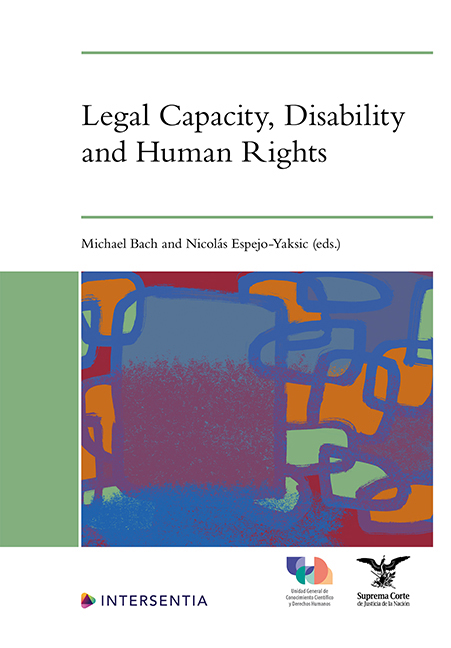Book contents
- Frontmatter
- Foreword
- Acknowledgements
- Contents
- List of Cases
- List of Contributors
- Legal Capacity, Disability and Human Rights: Introduction
- PART I HISTORICAL PERSPECTIVES AND THEORETICAL FRAMES
- PART II LAW REFORM: COUNTRY AND REGIONAL PERSPECTIVES
- PART III LEGAL QUESTIONS, PERSISTENT CHALLENGES
- Index
- About the Editors
Disability and Intersectionality: The Construction of Vulnerability in Sexual and Reproductive Matters
Published online by Cambridge University Press: 03 April 2024
- Frontmatter
- Foreword
- Acknowledgements
- Contents
- List of Cases
- List of Contributors
- Legal Capacity, Disability and Human Rights: Introduction
- PART I HISTORICAL PERSPECTIVES AND THEORETICAL FRAMES
- PART II LAW REFORM: COUNTRY AND REGIONAL PERSPECTIVES
- PART III LEGAL QUESTIONS, PERSISTENT CHALLENGES
- Index
- About the Editors
Summary
INTRODUCTION
This chapter aims to analyse the construction of vulnerability in sexual and reproductive matters with in the framework of the intersections between gender and disability. To this end, research with a feminist perspective and instruments of the international human rights system will be reviewed. At first, the concepts of violence, discrimination and intersectionality in the context of the specific situations experienced by women and girls in relation to their disability and legal capacity will be discussed. Subsequently, the dynamics of constructing vulnerability will be described in three areas: sexual choices, reproductive choices and institutionalised environments. Finally, an intersectional perspective is proposed as a roadmap for helping to advance realisation of Article 12 of the Convention on the Rights of Persons with Disabilities (hereinafter UNCRPD). An intersectional perspective deepens the understanding of legal capacity and the exercise of relational autonomy in consideration with diverse socio-historically produced categories.
Since the 1960s, Anglo-Saxon activists have politically challenged the dominant bio-medical definitions of disability. They demanded independent and inclusive life in the community, along with the freedom of choice and the ability to exercise control over the decisions that affected their lives, with the maximum degree of self-determination and interdependence with society. They promoted the creation of forms of support that would promote the full exercise of their rights and the construction of facilities that would conform to universal design principles.
Thus, they coined and shaped what is now known as the comprehensive social model of disability, through which the problems commonly associated with disability come to be seen as the result of social barriers. In this way, disability emerged as a social category of a life worthliving. Also, a socio-political field of study emerged which problematised intersecting axes of oppression. Consequently, progress was made during the 1980s in academic studies that conceived disability as a product of a particular type of social organisation, namely industrial capitalism, and which drew from socio-critical and historical interpretations linked to political economy.
- Type
- Chapter
- Information
- Legal Capacity, Disability and Human Rights , pp. 49 - 64Publisher: IntersentiaPrint publication year: 2023



